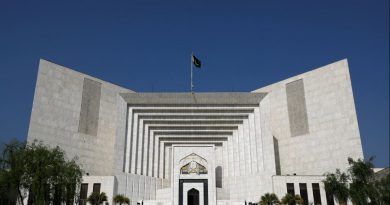G7 finance leaders vow to contain inflation, strengthen supply chains but avoid mention of China
Niigata (AP) — The Group of Seven’s top financial leaders united Saturday in their support for Ukraine and their determination to enforce sanctions against Russia for its aggression but stopped short of any overt mention of China.
The finance ministers and central bank chiefs ended three days of talks in Niigata, Japan, with a joint statement pledging to bring inflation under control, help countries struggling with onerous debts and strengthen financial systems.
They also committed to collaborating to build more stable, diversified supply chains for developing clean energy sources and to “enhance economic resilience globally against various shocks.”
The statement did not include any specific mention of China or of “economic coercion” in pursuit of political objectives, such as penalizing the companies of countries whose governments take actions that anger another country.
Talk this week of such moves by China had drawn outraged rebukes from Beijing. Officials attending the talks in this port city apparently balked at overtly condemning China, given the huge stake most countries have in good relations with the rising power and No. 2 economy.
The finance leaders’ talks laid the groundwork for a summit of G-7 leaders in Hiroshima next week that President Joe Biden is expected to attend despite a crisis over the U.S. debt ceiling that could result in a national default if it is not resolved in the coming weeks.
Japanese Finance Minister Shunichi Suzuki said that Treasury Secretary Janet Yellen mentioned the issue in a working dinner, but he refrained from saying anything more.
While in Niigata, Yellen warned that a failure to raise the debt ceiling to enable the government to continue paying its bills would bring an economic catastrophe, destroying hundreds of thousands of jobs and potentially disrupting global financial systems. No mention of the issue was made in the finance leaders’ statement.
The G-7′s devotion to protecting what it calls a “rules-based international order” got only a passing mention.
The leaders pledge to work together both within the G-7 and with other countries to “enhance economic resilience globally against various shocks, stand firm to protect our shared values, and preserve economic efficiency by upholding the free, fair and rules-based multilateral system,” it said.
G-7 economies comprise only a tenth of the world’s population but about 30% of economic activity, down from roughly half 40 years ago. Developing economies like China, India and Brazil have made huge gains, raising questions about the G-7′s relevance and role in leading a world economy increasingly reliant on growth in less wealthy nations.
China had blasted as hypocrisy assertions by the U.S. and other G-7 countries that they are safeguarding a “rules-based international order” against “economic coercion” from Beijing and other threats.
China itself is a victim of economic coercion, Chinese Foreign Ministry spokesperson Wang Wenbin said Friday.
“If any country should be criticized for economic coercion, it should be the United States. The U.S. has been overstretching the concept of national security, abusing export controls and taking discriminatory and unfair measures against foreign companies,” Wang said in a routine news briefing.
China accuses Washington of hindering its rise as an increasingly affluent, modern nation through trade and investment restrictions. Yellen said they are “narrowly targeted” to protect American economic security.
Despite recent turmoil in the banking industry, the G-7 statement said the financial system was “resilient” thanks to reforms implemented during the 2008 global financial crisis.
“Nevertheless, we need to remain vigilant and stay agile and flexible in our macroeconomic policy amid heightened uncertainty about the global economic outlook,” it said.
Meanwhile, inflation remains “elevated” and central banks are determined to bring it under control, it said.
Since prices remain “sticky,” some countries may see continued rate hikes, said Kazuo Ueda, Japan’s central bank governor. “The impact of the rate hikes has not been fully realized,” he told reporters.
Japan won support for its call for a “partnership” to strengthen supply chains to reduce the risk of disruptions similar to those seen during the pandemic, when supplies of items of all kinds, from medicines to toilet paper to high-tech computer chips, ran short in many countries.
Suzuki said details of that plan would be worked out later.
“Through the pandemic, we learned that supply chains tended to depend on a limited number of countries or one country,” he said, adding that economic security hinges on helping more countries develop their capacity to supply critical minerals and other products needed as the world switches to carbon-emissions-free energy.
Tensions with China, and with Russia over its war on Ukraine, inevitably loomed large during the talks in Japan, the G-7′s only Asian member.
“We call for an immediate end of Russia’s illegal war against Ukraine, which would clear one of the biggest uncertainties over the global economic outlook,” the joint statement said.
The financial leaders took time to listen to ideas on how to focus more on welfare in policymaking, rather than just GDP and other numerical indicators that often drive decisions with profound impacts on people’s well being.
“These efforts will help preserve confidence in democracy and a market-based economy, which are the core values of the G-7,” the finance leaders’ statement concluded.
Suzuki said he and other leaders learned much from a seminar by Columbia University economist Joseph Stiglitz, a Nobel prize winner who worked in the Clinton administration and who has championed what he calls “progressive capitalism.”
It’s a “very interesting view,” Suzuki said, adding that “so far, we’ve been mostly focused on GDP and other numerical indicators.”



